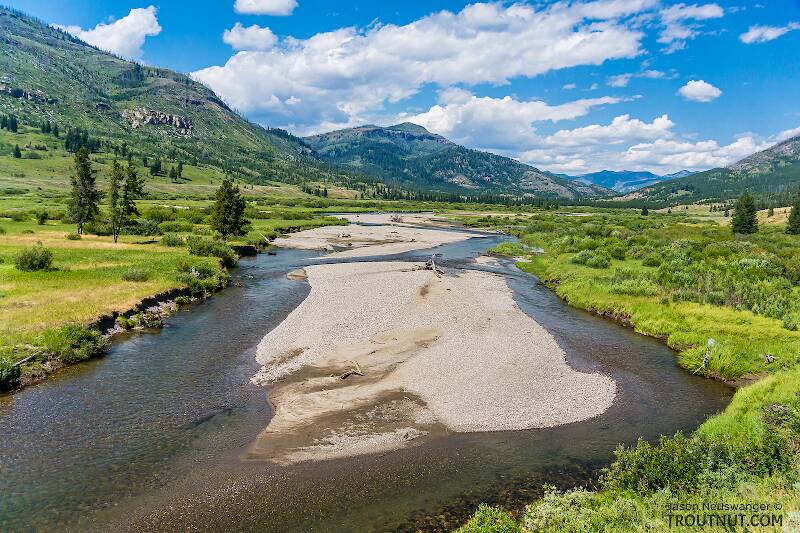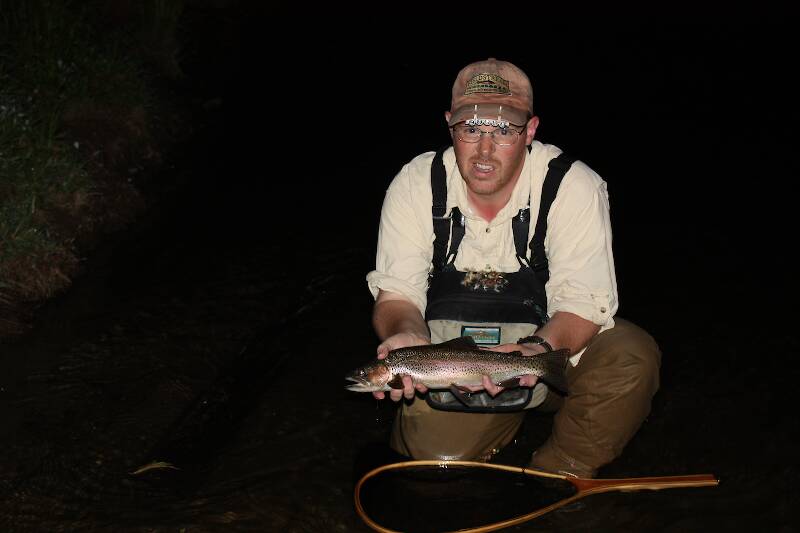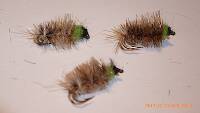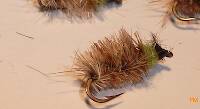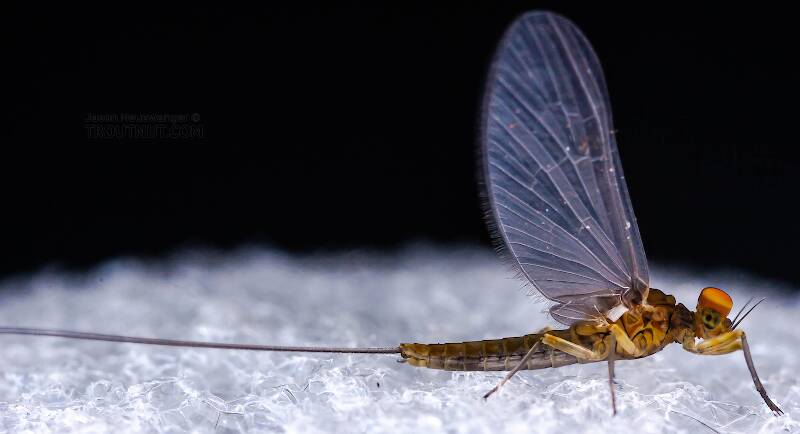
Blue-winged Olives
Baetis
Tiny Baetis mayflies are perhaps the most commonly encountered and imitated by anglers on all American trout streams due to their great abundance, widespread distribution, and trout-friendly emergence habits.
Featured on the forum
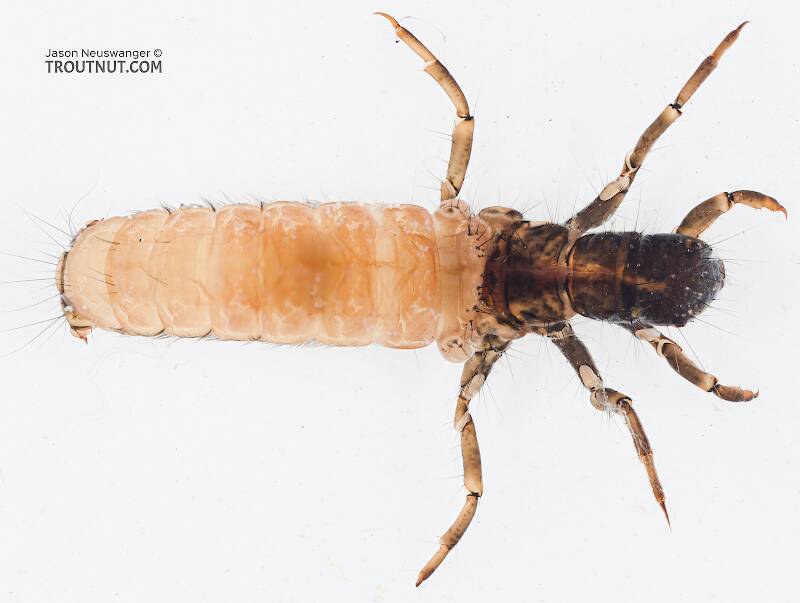
This specimen resembled several others of around the same size and perhaps the same species, which were pretty common in my February sample from the upper Yakima. Unfortunately, I misplaced the specimen before I could get it under a microscope for a definitive ID.

Troutnut is a project started in 2003 by salmonid ecologist Jason "Troutnut" Neuswanger to help anglers and
fly tyers unabashedly embrace the entomological side of the sport. Learn more about Troutnut or
support the project for an enhanced experience here.
JOHNW on Apr 16, 2009April 16th, 2009, 2:41 pm EDT
OK for those wet fly guys out there.
I have been instructed that this is a deadly pattern however I can't find a recipie for it.
The closest I can figure is the partridge and red squirrel soft hackle. What say you all?
JW
I have been instructed that this is a deadly pattern however I can't find a recipie for it.
The closest I can figure is the partridge and red squirrel soft hackle. What say you all?
JW
"old habits are hard to kill once you have gray in your beard" -Old Red Barn
Softhackle on Apr 17, 2009April 17th, 2009, 1:49 am EDT
I'll see what I can find out.
Mark
Mark
"I have the highest respect for the skilled wet-fly fisherman, as he has mastered an art of very great difficulty." Edward R. Hewitt
Flymphs, Soft-hackles and Spiders: http://www.troutnut.com/libstudio/FS&S/index.html
Flymphs, Soft-hackles and Spiders: http://www.troutnut.com/libstudio/FS&S/index.html
Wetfly1 on Apr 17, 2009April 17th, 2009, 1:57 am EDT
Hi John,
Try tying this pattern for the Hendricksons a good friend of mine has been hammering them on Yellow Breeches for the last few nights in the open water.
Hook: Mustad 3906B #12 or #14
Tail: Dark Dun Hen
Body: Male Hendrickson dubbing
Hackle: Dark Dun Hen
Wing: Dark Mallard Flank
When you dub the body on make sure you make real nice and thin just like the naturals. Let us know how you made out. My buddy told me he thinks there close to being over in the next few days. I would also fish that pattern you mensioned. Fish both those flies at the same time. I think you'll have some good hook ups.
Try tying this pattern for the Hendricksons a good friend of mine has been hammering them on Yellow Breeches for the last few nights in the open water.
Hook: Mustad 3906B #12 or #14
Tail: Dark Dun Hen
Body: Male Hendrickson dubbing
Hackle: Dark Dun Hen
Wing: Dark Mallard Flank
When you dub the body on make sure you make real nice and thin just like the naturals. Let us know how you made out. My buddy told me he thinks there close to being over in the next few days. I would also fish that pattern you mensioned. Fish both those flies at the same time. I think you'll have some good hook ups.
Softhackle on Apr 17, 2009April 17th, 2009, 3:29 pm EDT
I checked with a few friends, and I got one response as follows:
"I could only find one reference to the Hendrickson in Neme's Soft-Hackled fly imitations, but it was Ted Ward's Nymph and Emerger pattern from the Beaverkill.
* Hook: Mustad 94833
* Thread: Uni Dun 8/0
* Hackle: Grey Partridge
* Tail: 3 to 4 lemon wood duck barbs
* Body: Mixture of 2/3rds Sealex #110 and 1/3rd Sealex #117"
Now, I'm not sure this is the pattern you are looking for. Perhaps Syl has not yet publicized the recipe.
I will say that I've had some success fishing a Snipe & Pheasant during the Hendrickson hatch. Here's the recipe I use:
Snipe and Pheasant
Hook: Standard wet fly 12-18
Thread: Orange or brown
Hackle: Snipe or blue dun starling
Ribbing: Fine copper wire
Body: Three reddish brown fibers from a cock pheasant tail. For smaller flies, reduce the number of fibers
Snipe and Pheasant
Hope this helps some.
Mark
"I could only find one reference to the Hendrickson in Neme's Soft-Hackled fly imitations, but it was Ted Ward's Nymph and Emerger pattern from the Beaverkill.
* Hook: Mustad 94833
* Thread: Uni Dun 8/0
* Hackle: Grey Partridge
* Tail: 3 to 4 lemon wood duck barbs
* Body: Mixture of 2/3rds Sealex #110 and 1/3rd Sealex #117"
Now, I'm not sure this is the pattern you are looking for. Perhaps Syl has not yet publicized the recipe.
I will say that I've had some success fishing a Snipe & Pheasant during the Hendrickson hatch. Here's the recipe I use:
Snipe and Pheasant
Hook: Standard wet fly 12-18
Thread: Orange or brown
Hackle: Snipe or blue dun starling
Ribbing: Fine copper wire
Body: Three reddish brown fibers from a cock pheasant tail. For smaller flies, reduce the number of fibers
Snipe and Pheasant
Hope this helps some.
Mark
"I have the highest respect for the skilled wet-fly fisherman, as he has mastered an art of very great difficulty." Edward R. Hewitt
Flymphs, Soft-hackles and Spiders: http://www.troutnut.com/libstudio/FS&S/index.html
Flymphs, Soft-hackles and Spiders: http://www.troutnut.com/libstudio/FS&S/index.html
Quick Reply
Related Discussions
Topic
Replies
Last Reply
7
May 29, 2012
by Possumpoint
by Possumpoint
3
Jan 16, 2007
by Martinlf
by Martinlf
6
Sep 11, 2020
by Martinlf
by Martinlf

